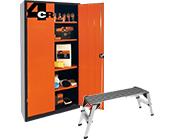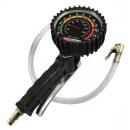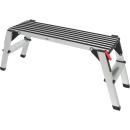workshop layout

Bodybuilder workshop layout
-
 515.1920Air inflator0.5 - 12 bar
515.1920Air inflator0.5 - 12 bar -
 515.3440Air hose reeland water 15m - 3/8
515.3440Air hose reeland water 15m - 3/8 -
 800.0960Stepaluminium
800.0960Stepaluminium
︾
Professional body shop fittings with Carross :
The layout of a body shop is a crucial component in ensuring an efficient, organised and safe working environment. Every detail counts to optimise productivity and the quality of the work carried out. The following text explores different aspects of body shop layout:
The layout of a bodyshop is of paramount importance to professionals striving to provide high-quality automotive repair services. The right layout can not only increase operational efficiency, but also contribute to the safety of workers and the preservation of equipment.
One of the key elements in the design of a body shop is the strategic layout of work areas. Workstations dedicated to preparation, painting, bodywork repair and other specific processes need to be organised in a logical and fluid way to minimise unnecessary movement and optimise workflow.
Workshop trolleys, equipped with drawers of various sizes, specialised modules and sturdy castors, are the heart of tool organisation. These trolleys can be positioned close to the appropriate workstations, ensuring fast, efficient access to the tools needed at every stage of the repair process.
The storage area for materials, spare parts and consumables must be carefully planned to avoid unnecessary clutter. Sturdy shelving, storage bins and a stock management system can help keep the inventory organised and make it easier to find the parts you need quickly.
Lighting is an often underestimated but crucial element in a body shop. Well-positioned LED lights provide optimum visibility of work surfaces, ensuring precise repairs and accurate damage assessment.
Worker safety is an absolute priority. Well-stored and accessible personal protective equipment, fire extinguishers, safety showers and clear signage of risk areas all contribute to maintaining a safe working environment.
Finally, energy efficiency and waste management must also be taken into account. The use of energy-efficient equipment and appropriate waste management systems helps to reduce the environmental impact of the workshop.
In short, fitting out a body shop requires careful planning and attention to detail. By integrating intelligent solutions for tool organisation, workflow, safety and energy efficiency, bodyshop professionals can create an environment conducive to excellence in their automotive repair work.
Our range of equipment for professional bodywork workshops:
In a professional workshop, efficiency and organisation are key to ensuring an optimal workflow. A variety of equipment and furnishings are essential to create a functional working environment. These include bucket dispensers, metal cupboards, preparation tables, workshop stools, ozonators, inspection trolleys, air inflators, footboards and workbenches.They play specific roles in meeting the varied needs of a professional workshop.
Bucket dispensers offer a practical solution for the orderly storage and distribution of small parts, screws and components. Strategically positioned in the workshop, these dispensers make it easy to access the parts you need without wasting time searching.
Metal cabinets are essential for tool organisation and safety. Equipped with multiple drawers and shelves, these cabinets allow craftsmen to store their equipment in an orderly fashion, while protecting it from theft and damage.
Preparation tables are workspaces dedicated to specific tasks. They provide a stable surface for meticulous preparation of parts, painting or other work requiring special attention. Some models can be fitted with extraction systems to collect dust generated during work.
Workshop stools provide ergonomic comfort for workers during long working hours. Height-adjustable and equipped with castors for easy mobility, these stools help to maintain a dynamic and adaptable working environment.
Ozonators are used to eliminate odours, bacteria and contaminants from the air in the workshop. They help maintain a healthy working environment by neutralising unwanted odours and ensuring optimum air quality.
Inspection trolleys provide a mobile platform for workers to inspect vehicles from all angles. Equipped with swivel castors, these trolleys make it easy to move around vehicles during inspection or repair work.
Air inflators are essential tools for adjusting vehicle tyre pressure. Easy to use, they guarantee safety on the road by ensuring that tyres are correctly inflated.
Running boards provide safe access to raised areas, making it easier to work at height. Sturdy and stable, these steps are an invaluable complement for tasks requiring safe access.
Finally, professional workbenches are sturdy, versatile platforms designed to support a variety of tools and jobs. With built-in storage and hard-wearing surfaces, these workbenches provide a solid base for demanding workshop tasks.
By combining these different pieces of equipment, a professional workshop can create a well-organised, functional and ergonomic working environment, promoting productivity and the quality of the work carried out.
How do you organise your professional bodywork workshop?
When it comes to fitting out a workshop, users often ask key questions to optimise the workspace and ensure maximum efficiency. Here's a text that explores the questions most frequently asked when fitting out a workshop:
Workshop design is a crucial step for any professional looking to create a functional and productive working environment. Users, aware of the impact of the organisation of their workspace on their efficiency, frequently ask certain key questions to maximise the benefits of their workshop.
The question of space layout is often at the top of the agenda. Users want to know how to organise the different work areas to maximise the fluidity of operations. Whether it's the proximity of workstations, the location of tools, or the creation of specific areas for particular tasks, strategic layout is essential.
Storage capacity is another frequently asked question. Users want to know how to maximise storage space for their tools, parts and equipment without compromising ease of access. Solutions such as metal cabinets, shelving and modular storage are often explored to address these concerns.
Users are also concerned about the mobility of equipment. Do sturdy castors on workshop trolleys, workbenches and other furniture facilitate the flexibility and adjustments needed in the workshop? Mobility is a key aspect of being able to adapt quickly to the changing needs of a project.
Waste and environmental management are growing concerns. Users are asking questions about the implementation of waste sorting systems, the use of energy-efficient equipment, and how to optimise the energy efficiency of their workshop.
Safety is a major concern for users. Questions about the implementation of safety measures, such as the installation of fire extinguishers, the clear marking of hazardous areas, and the availability of personal protective equipment, are frequent.
Ergonomics is also an important consideration. Users ask about the choice of furniture and tools that encourage a healthy working posture, thereby reducing the risk of injury from repetitive movements or poor ergonomics.
Finally, the versatility of the layout is often a key concern. Users want to know to what extent the workshop can be adapted to different tasks and evolve with the changing needs of the business.
In short, the layout of a workshop raises many crucial questions. From the layout of the space to safety, mobility and ergonomics, every aspect contributes to creating an optimal working environment.
Our major brands of equipment for fitting out your bodywork workshop:
Fitting out workshops requires reliable, high-performance equipment, and some of the best-known brands, such as 4CR, Devilbiss, Flex, Général Pneumatic and KS Tools have set themselves apart by offering a wide range of tools and solutions to meet the specific needs of professionals. Let's explore how each of these brands contributes to the efficiency and functionality of workshops.
The 4CR workshop equipment brand:
Specialising in cleaning and degreasing solutions, the 4CR brand offers a comprehensive range of industrial-grade chemicals. Its detergents and degreasers are designed to meet the high standards of automotive repair shops, ensuring effective cleaning of surfaces, parts and tools.
The Devilbiss brand of workshop equipment:
Renowned in the field of paint equipment, Devilbiss offers high-quality spray guns and spray systems. Devilbiss paint spray guns are renowned for their precision and performance, offering bodywork professionals optimal control during painting operations.
Flex :
The Flex brand excels in the manufacture of top-of-the-range power tools, including sanders, polishers and grinders. Flex products are appreciated for their durability, power and ergonomics, making them indispensable in body shops where finishing is crucial.
Général Pneumatic :
A specialist in pneumatic tools, Général Pneumatic offers a wide range of impact spanners, chipping hammers, and other air-powered tools. These robust, high-performance tools are essential for mechanical and repair tasks requiring reliable pneumatic power.
KS Tools :
This brand is renowned for its complete workshop equipment solutions. From workshop trolleys to hand tools, KS Tools offers a variety of well-designed equipment to meet the needs of professionals. KS Tools workshop trolleys, for example, are often appreciated for their sturdiness, intelligent organisation and mobility.
By combining products from these brands, workshops can create well-equipped workspaces, from preparation to paint and mechanics. Fitting out with quality equipment from leading brands contributes to operational efficiency, worker safety and quality results in the demanding automotive repair sector.